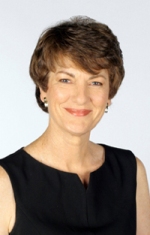Main site navigation
Geraldine Doogue

More information about Geraldine Doogue can be found in the AWAP register.
Geraldine Doogue, one of Australia's most respected journalists, has been a reporter for the West Australian, The Australian, 2UE, Channel 10 and the ABC; presenter of ABC Radio National's Life Matters, Sunday Profile and Saturday Breakfast; and host of ABC TV's Nationwide and Compass. She played a major role in ABC TV's coverage of the Gulf War, receiving a United Nations Media Peace Prize and two Penguin Awards.
Geraldine Doogue completed a Bachelor of Arts and planned to train as a schoolteacher in Perth, but in 1972 applied on impulse for a cadetship in journalism with the West Australian instead. She went on to write for The Australian, and spent two years at the London bureau for the Murdoch group's Australian papers. While being interviewed for ABC TV's Four Corners about the boom in diamond mining in Australia in 1978, Doogue impressed executives with her on-camera presence and was offered the position of compere for ABC TV's Nationwide program in Perth. She later hosted the NSW edition of the program in Sydney, before working on commercial radio at 2UE, and commercial television as co-presenter of Channel 10's Eyewitness News with Steve Liebmann. She returned to the ABC in 1990.
Doogue played a central role in ABC TV's coverage of the first Gulf War in 1991, and received two Penguin Awards and a United Nations Media Peace Prize for her efforts. In 1992, she began presenting Life Matters for ABC Radio National and retained the post for eleven years. Since 1998, she has been host of ABC TV's Compass program, investigating spirituality, philosophy and belief. She also hosts ABC Radio National's Saturday Extra, discussing international politics and Australia's role on the world stage.
In 2000, Doogue was awarded a Churchill Fellowship for social and cultural reporting. In 2003, she was made an Officer in the Order of Australia for distinguished service to the community and to the media on issues involving ethics, values, religion and social change.
In recent years, Doogue has taken a particular interest in the relationship between Islam and the Western world. In 2003 she co-produced the Compass program 'Tomorrow's Islam' with Peter Kirkwood, examining the ways in which Western Muslims have been seeking solutions for some of the most pressing issues in 21st century Islam. Doogue and Kirkwood published their book, Tomorrow's Islam: Uniting Age-Old Beliefs and a Modern World (Sydney, ABC Books) in 2005.
On 3 November 2005, Doogue gave a presentation at the University of Wollongong on the role of the media as peacemakers. Earlier that same day, Prime Minister John Howard had announced amendments to the Government's anti-terrorist legislation in response to a specific terrorist threat. This raised the question, said Doogue, of whether freedom of speech should be sacrificed for national security. Any law that limited the capacity for good journalism was cause for concern, and the role of good journalism was to draw people into the community around them: 'Respectful public debate is the life blood of democracy', she told her audience, 'encouraging accountability and decent behaviour. Good quality journalism that doesn't dodge difficult areas, but is careful when it goes into them, encourages problem-solving'.
Image
Image reproduced courtesy of the Australian Broadcasting Corporation